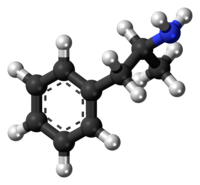
Photo from wikipedia
Peripheral administration of PYY3–36, a fragment of peptide YY (PYY), has been reported to reduce food intake by activating the neuropeptide Y2 receptor (Y2R). An N-terminally truncated PYY analogue, benzoyl-[Ala26,Ile28,31]PYY(25–36)… Click to show full abstract
Peripheral administration of PYY3–36, a fragment of peptide YY (PYY), has been reported to reduce food intake by activating the neuropeptide Y2 receptor (Y2R). An N-terminally truncated PYY analogue, benzoyl-[Ala26,Ile28,31]PYY(25–36) (1), showed a relatively potent agonist activity for Y2R but a weak anorectic activity by intraperitoneal administration (2000 nmol/kg) in lean mice because of its markedly poor biological stability in the mouse serum. Notably, two cyclohexylalanine (Cha) substitutions for Tyr residues at positions 27 and 36 (4) improved the stability in the mouse serum concomitant with enhanced anorectic activity. Further optimization at positions 27, 28, 30, and 31 revealed that 21, containing Cha28 and Aib31 residues, showed a more potent anorectic activity than PYY3–36 at a low dose of 300 nmol/kg. The minimum effective dose by intraperitoneal administration of 21 was 30 nmol/kg (ca. 52 μg/kg) in mice, suggesting the biologic potential of short-length PYY3–36 analogues with a potent anorectic effect.
Journal Title: ACS Omega
Year Published: 2017
Link to full text (if available)
Share on Social Media: Sign Up to like & get
recommendations!